Jimmy Casas served twenty-two years as a school leader. He is a best-selling author, speaker, leadership coach, and currently serves as an adjunct professor at Drake University teaching a graduate course on Educational Leadership. Jimmy is the CEO and President of J Casas and Associates aimed at serving teachers, principals and superintendents in school districts across the country by providing high quality, practical and meaningful coaching support.
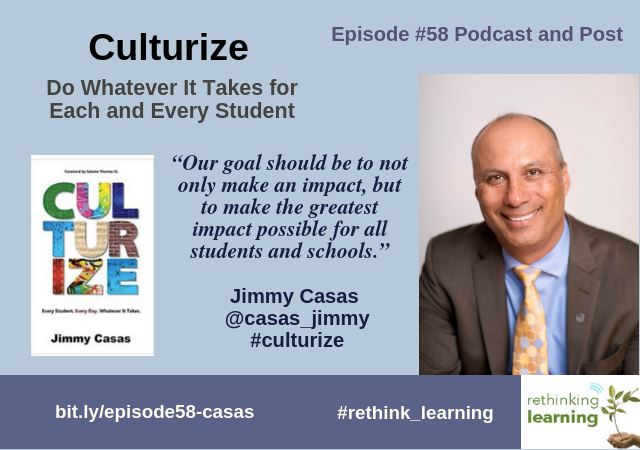
Podcast: Play in new window | Download
I’ve been following Jimmy on social media, have read his books and refer to his book, “Culturize” especially when helping schools develop positive cultures. I had so much fun talking with Jimmy and even learned something that I think he never told anyone before. Enjoy!
You and your family
I was born and raised in Iowa and continue to live in Iowa. I also have a home in Chicago since it is the hub and easy to get in and out of. A good reason for moving there was my oldest son, AJ, recently got transferred to Kalamazoo, Michigan and works for Stryker Corporation. He’s done really well and we’re very proud of him and all of our three children. My oldest daughter, Miraya, graduated from college, lives at our home in Bettendorf, and is a full-time nurse in labor and delivery. My youngest daughter, Marisa, who is 18, is a freshman at the University of Iowa. We’re all proud to be hawks and feel very very blessed that we have three beautiful children who are very kind young people. As parents, that’s all we can ask for is that our children are good people who have good hearts.
What Connected Educators Do with Jimmy Casas – YouTube
Experiences in and out of school that impacted you
I struggled in school, but I did have teachers in elementary school who really cared about me, supported me and tolerated me. Somewhere along the way when I got to middle school, I lost my way. That was due to a loss of confidence and struggling in terms of reading. Literacy was always an issue for me. I was good at math in elementary school, but when I got to middle school, I lost confidence in math also. By the time I got to high school, academics was very difficult for me.
“All of these experiences lead us on a journey to who we are and what we do with that. What do we do with the experiences to make a change in a positive way in our personal lives and hopefully in the lives of others?”
When I left school I didn’t intend to become an educator. I actually had other ideas of what I wanted to do. Life comes at you and I wasn’t ready for the rigors of college. I was not only a dropout of college once, twice, but three times. At one point, i gave up and thought college was not for me so I left and went to work in a sales job for a year which went really well. In fact, they wanted me to stay on. When my mentor was released, I was asked to take his place. I was 19 at the time taking a 49-year-old gentleman’s job who has children in college. It dawned on me that he didn’t have an education either and thought, “is that same thing going to happen to me where someone is eventually going to come along and take my job away?”
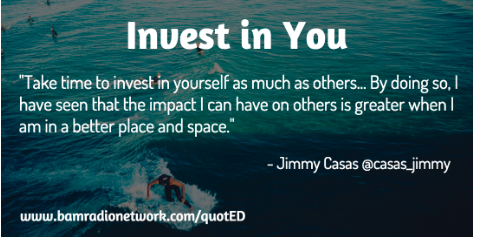
That’s what prompted me to go back to school and rethink things. I remember how upset the company was at me for leaving. It dawned on me that they really didn’t care about me. They only cared about me if I was making them money. As soon as I made the decision to go back and invest in school and my studies, it didn’t take long for me, I began to build confidence that I could do this right and finally committed to it. Post-secondary is about having opportunities for young people to find themselves and figure out their own path.
Don’t put a timeline on you that others expect you to get this or that done by a certain time. Take your own journey and then you will figure it out.
My father always said to me was “to make hard work your passion because then it doesn’t matter what you decide to do and you will be successful. Don’t label yourself that you have to be this or have to be that. Make hard work your passion. Whatever you decide to do, you will be successful.” Wise words from a person who never finished school.
So what path did you take?
 I did my undergrad, and I still didn’t know what I was going to do. I decided I wanted to be an FBI Agent so I went back to follow that process. They told me it would take a couple of years and that I should do something in the meantime just in case I didn’t make it. So I went to grad school and decided to volunteer at an elementary school starting at 4 hours a week, then 4 hours a day to eventually working full-time. They needed help and I wanted to help. I had the time to do it plus the more I did there, the more I liked it.
I did my undergrad, and I still didn’t know what I was going to do. I decided I wanted to be an FBI Agent so I went back to follow that process. They told me it would take a couple of years and that I should do something in the meantime just in case I didn’t make it. So I went to grad school and decided to volunteer at an elementary school starting at 4 hours a week, then 4 hours a day to eventually working full-time. They needed help and I wanted to help. I had the time to do it plus the more I did there, the more I liked it.
At Christmas, I got a call to go to Quantico to do my final testing, a physical. I didn’t pass the test because of my eyesight, so I went back to retake it and failed it again. My heart was broken. I even got my picture was taken and ready for the FBI. I really got to know the people over two years who had corrected vision. You see, once you’re in, it didn’t matter. To get in the FBI, you had to qualify in a certain range and it was crushing to not make the range. So I went back to school to do my masters to become a teacher. Later, I had laser surgery to correct my vision, but I realized then that teaching was my calling.
Your journey as an educator and then principal at Bettendorf HS
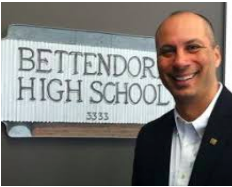 My first teaching job was as a bilingual teacher in the Milwaukee Public Schools. I was blessed because there were people who saw potential in me and encouraged me to go back to grad school in an Education Leadership program. Then I spent four years in the classroom and then at the age of 26, I became a principal after being in 3 districts, Milwaukee PS (3 years), Iowa City School District (5 years), and then, in 2002, took the job as principal of Bettendorf High School in Iowa for 14 years, 22 years all together.
My first teaching job was as a bilingual teacher in the Milwaukee Public Schools. I was blessed because there were people who saw potential in me and encouraged me to go back to grad school in an Education Leadership program. Then I spent four years in the classroom and then at the age of 26, I became a principal after being in 3 districts, Milwaukee PS (3 years), Iowa City School District (5 years), and then, in 2002, took the job as principal of Bettendorf High School in Iowa for 14 years, 22 years all together.
We had a great group of people with great support at Bettendorf so we were able to do things we are very proud of. Bettendorf has always been looked upon as one of the best schools in the state of Iowa, but I started thinking that I was walking into an adult-centered culture instead of student-centered. They still had great success. The challenge of that is how do you move an organization that sees themselves as successful so why would they do anything differently? What they didn’t see is that they could be so much better. We needed to do great things for all of our kids. To shift that mindset is very difficult. The good news is that we were blessed to have a real core group of people who understood that. The second thing, in terms of success, is the ability to sustain leadership over a long period of time. The more change in leadership the more issues we create for ourselves and stress on an organization. If we’re doing it right, building a community of leaders, no one principal can do it by themselves. To be truly successful, we need to build our capacity and grow more leaders in our organization. To build the skillset to do this, you need to have the conversations in a way that doesn’t hurt your culture. By avoiding the conversations, you can make the culture worse.
Culturize: Core Principles of Positive School Culture
People want to do really good things for kids, but they get exhausted with a myriad of variables that come into play, and over time they lose their focus. They forget their sense of purpose and why they went into the profession. Part of leadership is to keep people focused, energized, and reminding them that what they do does make a difference. But not just telling them, you have to show them. In order to do that, you have to lead from the core. I’m certainly not the same principal at year 22 than what I was at year 1. We are always evolving in the role of principal.
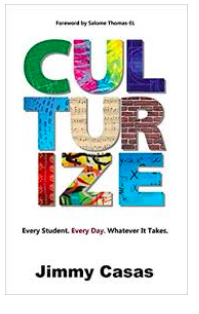
The idea of culturize is leading from the core. Those core principles are:
- Champion for all students
- Expect Excellence
- Carry the Banner
- Be a Merchant of Hope
When you lead from your core, we have to live that core. If we are not living it, then it comes across pretty disingenuous and losing credibility. People confuse the idea of being a champion for kids. It doesn’t mean we are going to let kids get away with things or that they are always right. It means to hold kids to the highest expectations. When you care about children and you have kids that are struggling in school, it’s really easy to start feeling sorry for those kids. We can’t do that. The reality is that when we begin to feel sorry, we pull back and make things easier for them and we shouldn’t be doing that. To me, it’s an equity issue. So we really should be holding all kids to the same accountability in terms of what we expect from them. What we need to begin to do is see it through their lens and be more empathetic. They don’t need our sympathy, they need our empathy. We need to remember what it feels like to be a child who struggles in school, to know what it feels like to have fear, anxiety, and worrying about what other kids feel about them, and not to let others down. That’s what it means to be a champion for kids.
I shared the story in my book about my baseball coach who was not my champion but I learned from that. Mr. Kelly Morgan, a vice-principal, was truly my champion for me and many other students. He had a difficult job as a disciplinarian, but he went out of his way to know everyone. He knew me, my family, and helped them navigate the system. What I learned is that I don’t judge anyone for specific circumstances. It’s what we do with those experiences.
****

This is Barbara:
I really enjoyed the conversation with Jimmy and shared so much but there is more than we have here. Please listen to the entire podcast and leave a comment for Jimmy or a review on iTunes. I’m so honored that he shared so many experiences and ideas. He has a new book released on December 9th with his co-author Jeff Zoul, “Stop Right Now: 39 Stops to Making Schools Better.”
****
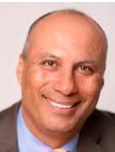 Jimmy Casas served twenty-two years as a school leader, including fourteen years as Principal at Bettendorf High School. Under his leadership, Bettendorf was named one of the Best High Schools in the country three times by Newsweek and US News & World Report.
Jimmy Casas served twenty-two years as a school leader, including fourteen years as Principal at Bettendorf High School. Under his leadership, Bettendorf was named one of the Best High Schools in the country three times by Newsweek and US News & World Report.
Jimmy was named the 2012 Iowa Secondary Principal of the Year and was selected as one of three finalists for NASSP 2013 National Secondary Principal of the Year. In 2014, Jimmy was invited to the White House to speak on the Future Ready Schools pledge. Jimmy is also the author of three books, “What Connected Educators Do Differently,” “Start. Right. Now. – Teach and Lead for Excellence,” and his latest release and best-selling book “Culturize – Every Student. Every Day. Whatever it Takes.”
Jimmy currently serves as an adjunct professor for Drake University, teaching courses in educational leadership. Finally, he is the owner and CEO of J Casas & Associates, an educational leadership company aimed at organizing and providing world-class professional learning services for educators across the country.
Jimmy’s Contact information
- Twitter: @casas_jimmy – Twitter hashtag: #culturize
- Facebook: https://www.facebook.com/jimmycasasculturize
- LinkedIn: https://www.linkedin.com/in/jimmy-casas-bb863432
- Website “Lead with Passion”: https://jimmycasas.com/
- Instagram: https://www.
instagram.com/casas_jimmy/
Intro music:
“BossaBossa” Kevin MacLeod (incompetech.com) Licensed under Creative Commons: By Attribution 3.0 License http://creativecommons.org/licenses/by/3.0/
*****
Interested in checking out more of the Rethinking Learning podcasts and reflections, click on the podcast tab at the top, the logo below, or go to https://barbarabray.net/podcasts/
For more information about Barbara’s new book, Define Your WHY, go to this page or click on the image of the book for resources, questions, and links.






